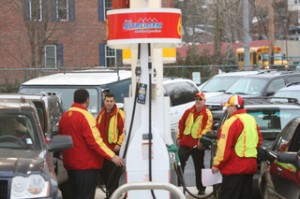Consumers may relish the sharp slump in fuel prices during the last few months, but they anticipate prices will eventually rebound – and want automakers to continue putting a premium on fuel economy, according to a new survey.
In the early weeks of the New Year, motorists in more than 40 states were paying less than $2.00 a gallon, according to industry reports. But the new study by the Consumer Federation of America (CFA) predicts prices will surge back to around $3.20 a gallon within two years. Looking five years out, meanwhile, they expect to be paying around $3.90 a gallon at the pump.
“There’s a good reason why today’s car buyers still believe fuel efficiency is important—they understand that gas prices always go back up,” said Jack Gillis, CFA director of Public Affairs and author of The Car Book.
The study found that 86% of American motorists consider gas mileage will be “important” in their next car purchase, while 57% say fuel economy will be “very important.”
That might come as a bit of a surprise considering recent shopping trends. Sales of pickups, utility vehicles and other light trucks have soared in recent months. And consulting firm IHS Automotive now expects that small crossover and sport-utility vehicles will outsell passenger sedans this year for the first time.
“Buying an inefficient vehicle during periods of low gas prices condemns the consumer to wider swings in monthly costs, much higher monthly peaks, and a whopping overall increase in lifetime gas costs,” said Dr. Mark Cooper, CFA’s director of Research.
On the positive side, consumers have been focusing on more fuel-efficient trucks – and manufacturers have put a premium on meeting that demand. Ford Motor Co., for example, launched an all-new version of its F-Series pickup for 2015 using a lightweight aluminum body that has helped it increase fuel economy by several miles a gallon. Other makers have been adopting downsized engines. Volvo, for one, will offer a new plug-in hybrid version of its 2016 XC90 sport-ute.
(Gas prices on the rise after 123-day decline. For more, Click Here.)
But industry leaders – including Ford CEO Mark Fields – also have been making noises about the tough new fuel economy standards facing the industry in 2025. They may seek to have the 54.5 mpg mandate rolled back or delayed when an industry-government review is held two years from now. The new CFA survey would suggest that consumers would oppose anything that delays further mileage increases.
(Click Here for details about new vehicle fuel economy improving.)
“Consumers are smart and have long memories, so it’s no surprise that they still want more fuel efficiency even though today’s gas prices may be low,” said Gillis.
The consumer group noted that a motorist who bought a vehicle getting just 18 mpg today would spend about $178 a month for gas, on average, today. If the forecasted fuel price increase holds true, that would jump to $267 a month two years from now, and reach $325 per month in 2020.
Fuel prices have already begun to rebound, though the numbers are still way down from where they stood at this time last year. Petroleum industry analysts find it difficult to agree on short-term trends – which can be influenced by factors ranging from U.S. oil production to Mideast turmoil. But few expect to see petrol prices remain anywhere near current levels for long.


Of course the price of fuel will jump rapidly even though there is a glut of oil and it will continue.